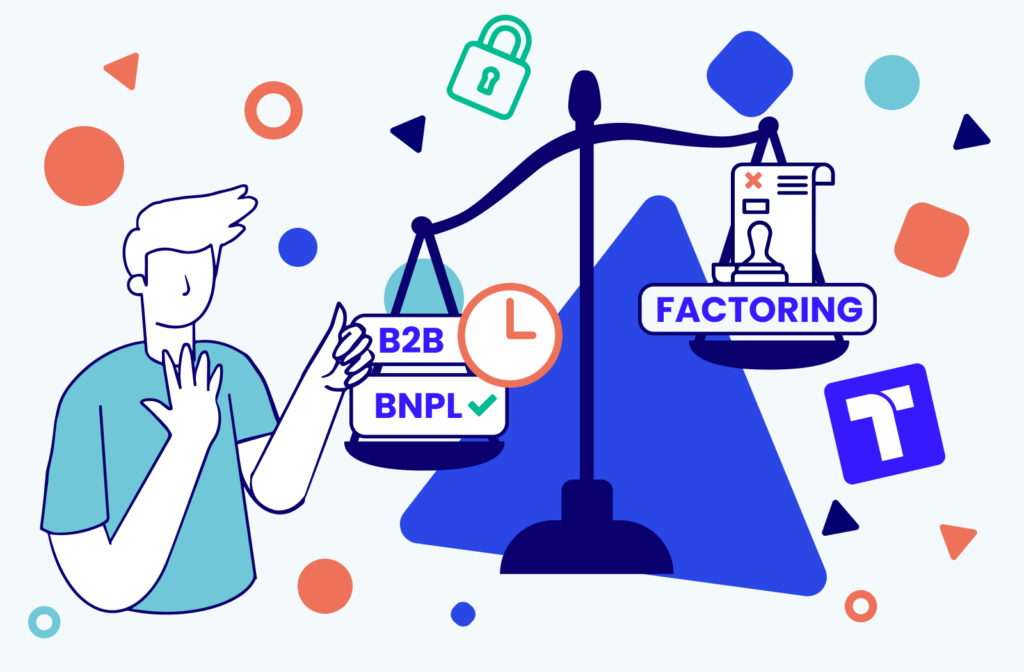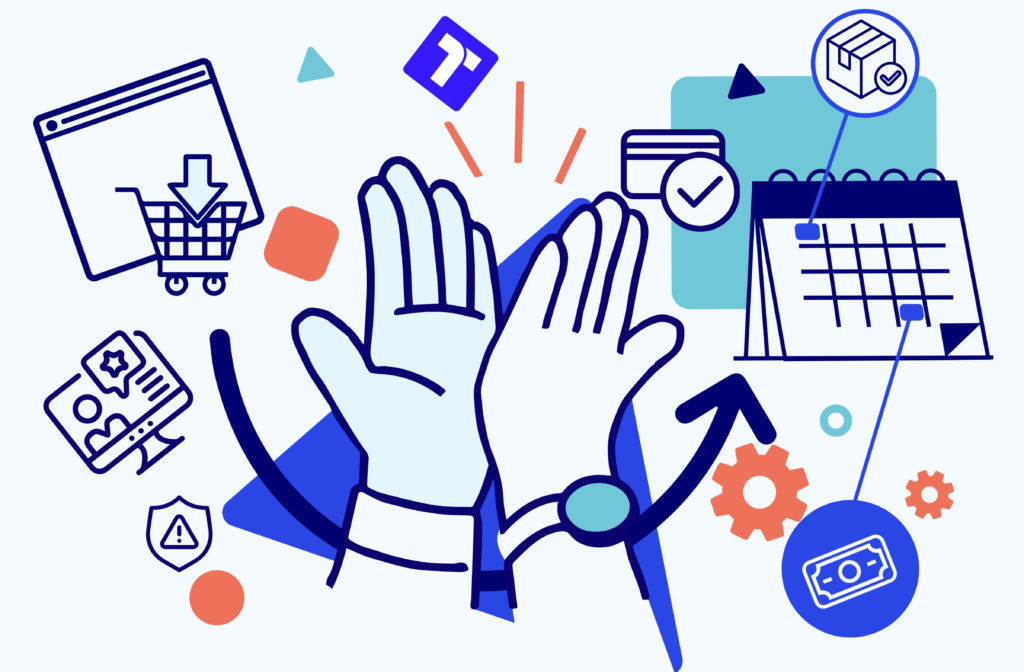
We compare invoice factoring and B2B BNPL (Buy Now, Pay Later), two methods merchants use to improve their cash flow.
When two businesses trade, one often waits to get paid. This challenges merchants, especially for SMEs or growing companies. AREA42’s research shows 72% of strictly and mainly B2B companies accept payment terms.
Cash flow is still king
Cash to pay bills, invests in stock and supplies, and keeps operations going. Companies to get money they need now and improve their cash flow. Rather than waiting months to get paid with their cash tied up.
What’s the difference between invoice factoring and B2B BNPL (Buy Now, Pay Later)?
How does invoice factoring (aka accounts receivable factoring) work?
Invoice factoring lets businesses get cash right away by selling their unpaid invoices, i.e. accounts receivable. That’s why invoice factoring is also known as accounts receivables factoring. Another term commonly used for this is debt factoring. Here’s how how it works:
- A company sells a product or service to another company.
- They send an invoice to the buyer, but the buyer has time to pay, often 30 to 90 days.
- Instead of waiting, the seller sells this unpaid invoice to an invoice factoring company at a discount.
- Then, the invoice factoring company gives them most of the money. This immediately boost cash flow – it’s fast invoice financing. The percent varies, but often the invoice factoring company buys the invoice at 70% or 90% of the cost. Meaning the seller receives 70% to 90% of the invoice value. This is often called selling your accounts receivables at a discount.
- When the buyer pays the invoice later, the factoring company collects it. The factoring discount fee is what the factoring company charges the merchant. And, after taking its discount fee, the invoice factoring service would pay the seller the remaining balance of the invoice value.
In short, invoice factoring helps businesses to get most of their money quickly by trading their accounts receivable for a fee and money now. There’s less waiting time for incoming cash, although there is a cost.
Is invoice factoring the same as sales ledger financing?
No. This suits companies that have moved beyond invoice factoring. But, they don’t yet qualify for a line of credit like a large corporation would have. A company submits their entire sales ledger, and 80-85% becomes eligible for financing. If a mid-sized company has outgrown invoice factoring, has very good sales ledger management in place, submitting their entire sales ledger would be an attractive option.
Invoice finance: is invoice factoring the same as invoice discounting? (hint: credit control)
Factoring and invoice discounting are similar, but both are types of invoice financing. Invoice discounting also involves providing cash to the merchant as a percentage of the sales invoice value. But, while invoice factoring puts the onus of credit control on the factoring company, invoice discounting leaves merchants responsible for their own credit control.
Recourse factoring vs. non-recourse factoring
What’s the difference between recourse and non-recourse factoring?
Recourse factoring is when the company selling its accounts receivables has to buy back their invoices if the factoring company cannot collect. Non-recourse factoring means the factoring is generally fully responsible for non payment. So, non-recourse factoring, although less common, is safer for the merchant.
Pros and cons of invoice factoring
Advantages of invoice factoring
- Fast cash flow: Sellers don’t wait long to get paid when they factor invoices. Most factoring companies pay out in 24 to 48 hours after the initial setup and approval process.
- Easier cash management: Companies get a predictable amount of cash.
- Simple setup: No complex T&Cs. Just sell the invoice, get paid, and let invoice factoring work for you.
- Vs. bank loan: Invoice factoring is typically cheaper and easier to get than bank loans.
- Incumbent: Historically factoring is effective – businesses are comfortable with it.
- (Note: Some services may have an invoice financing calculator to help predict costs.)
Disadvantages of invoice factoring
- Costly fees: Factoring companies take a cut, which can get expensive.
- Not 100%: An invoice is typically bought at a discount, perhaps 70-90% of the value. The factoring company provides this money to the seller as an advance, so the seller doesn’t get 100% of what the invoice is worth.
- Credit checks: The buyer’s credit history impacts the process, as factoring companies want low-risk invoices. They take on the risk that a customer fails to pay.
- Reputation risks: Buyers might see invoice factoring as a sign of financial stress, and this could cause relationship strain.
Potential problems with invoice factoring
Some problems or obstacles can occur when invoice factoring.
Invoice factoring is backward-looking. What does that mean? Factorable invoices are from transactions that have already occurred, i.e. accounts receivable. This leads to some issues, including:
- Partially fulfilled invoices: These invoices generally cannot be factored. In order to qualify for factoring, the product (or service) on the invoice must be delivered in full. So, if a company has partially fulfilled invoices, those are typically not yet available for invoice factoring.
- Pre-billing invoices: Sometimes a company might send an invoice for a product (or service) before delivery. Also not available for invoice factoring.
- Concentration of invoices: Businesses with a high concentration of invoices from only a few customers may find invoice factoring unsuitable.
- Invoice verification: If an invoice cannot be verified by the factoring company, it cannot be factored.
What affect can the factoring company have on your customers?
- Depends how they pursue bad debts: Customers pay the factoring company rather than the merchant. So, invoice factoring can harm relationships with customers if the factoring company pursues debts aggressively.
Is invoice factoring legal?
Yeah. Invoicing factoring is a commonly employed and recognised method of improving financial results. Work with a reputable factoring company and review contract conditions and fee schedules to protect you from legal infringement.
How does B2B Buy Now, Pay Later (BNPL) work?
B2B BNPL is a newer trade finance solution. You’ve heard of BNPL for shoppers (consumers), letting people pay later when buying clothes, gadgets, etc. Unlike invoice factoring, BNPL is not backwards-looking, i.e. the BNPL service does not buy unpaid invoices. Instead, it finances upcoming deals.
In contrast to invoice factoring, B2B BNPL works like this:
- A company buys goods or services from another business – either directly or through a B2B marketplace.
- Instead of paying immediately, they choose BNPL, e.g. this could be right at checkout.
- Enter the third party BNPL company, e.g. Terms.Tech.
- This third party pays the seller upfront and enables the seller to offer payment terms to the buyer.
- The buyer has more time to pay back the third party, usually 30 to 90 days. (But, potentially up to 120 days with Terms.Tech).
With B2B BNPL, the seller gets paid quickly – a veritable cash injection! – perhaps upon delivery depending on financing provider. Meanwhile, the buyer enjoys more time to pay, like with traditional trade credit and net payment terms.
Pros and cons of B2B BNPL
Advantages of B2B BNPL
- Instant payment: Sellers get paid right away. No stress! No late payments! No chasing bad debts!
- Flexible payments for buyers: Buyers get more time to pay, which can boost sales and conversion.
- Boosts buyer relationships: When you enable buyers to enjoy the extra payment time, you also improve your customer relationships and trust.
- 100%: With the right provider, 100% could be paid to the seller upfront (rather than the discount invoice factoring uses). Credit control shifts to the BNPL company.
- Approval processes: BNPL providers should take on the responsibility to check the buyer’s credit or financial strength. Like with invoice factoring companies, the BNPL service will likely be responsible to ensure the customers pay their bills.
- Vs. bank loan: B2B BNPL is also typically cheaper, faster, and easier to obtain than a bank loan.
Disadvantages of B2B BNPL
- Costs of service fee: BNPL comes with a service fee. Each provider will have its own approach to fee pricing.
- Debt build-up: For buyers, like any form of credit, BNPL can lead to a debt cycle if overused. Buyers should maintain their own credit control and monitoring.
Is B2B BNPL legal?
Also, yeah. It’s the new kid on the block. But, basically a modern way of offering net payment terms.
Like invoice factoring, B2B BNPL is a recognised method of improving financial results. Work with a reputable BNPL company and, of course, review contract conditions and fee schedules to protect you from legal issues, too.
Boost cash flow with Terms.Tech
Terms.Tech, an AREA42 working capital product, offers B2B BNPL: upfront payment to sellers and flexible payment terms to buyers.
Sellers receive cash as if the buyer has paid upfront. Buyers get net terms to make payments. This allows sellers to offer payment terms they otherwise can’t offer on their own. So, there’s no need for accounts receivable factoring with Terms.Tech. Merchants’ customers get what they need but those customers pay Terms.Tech later according to the agreed net payment terms.
Do merchants need to worry about unpaid invoices?
Terms.Tech helps to reduce the risk of unpaid invoices – a huge plus for sellers. Why? We take on collections and late payments as part of our service! Leave bad debts in the past.
We also offer a fully-integrated version or self-service solution so small businesses can maintain or establish trustworthy customer relationships.
Where?
Terms.Tech’s available throughout the EEA and Switzerland. Having broad European reach differentiates us from other B2B BNPL payment terms solutions on the market.
Time to boost your cash flow
Both an invoice factoring service and a B2B BNPL solution provide ways to keep your cash flow healthy. We won’t tell you which to choose (wink, wink)! But, ponder these questions:
- Do you have your own e-commerce?
- Looking to set one up?
- Want to decrease cart abandonment at checkout?
- Already using invoice factoring and curious about another method to boost cash flow?
- Sick and tired of late payments, outstanding invoices, cash flow challenges, and/or taking on credit risk?
Many businesses answer ‘yes’ to these questions. Have you?
If so, we recommend getting in touch to discover more about the best ways Terms.Tech will help your cash flow.
Last question. Selling on a B2B marketplace and want to increase sales and conversions? Put that marketplace in touch with us. We love partnering with B2B marketplaces in any industry!



